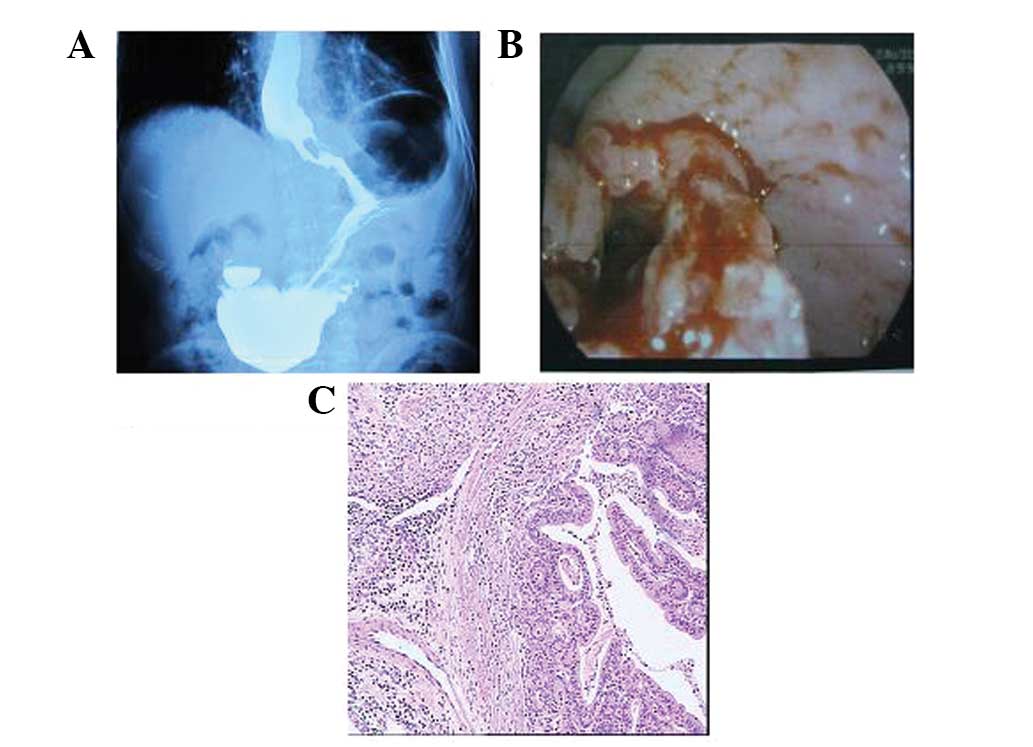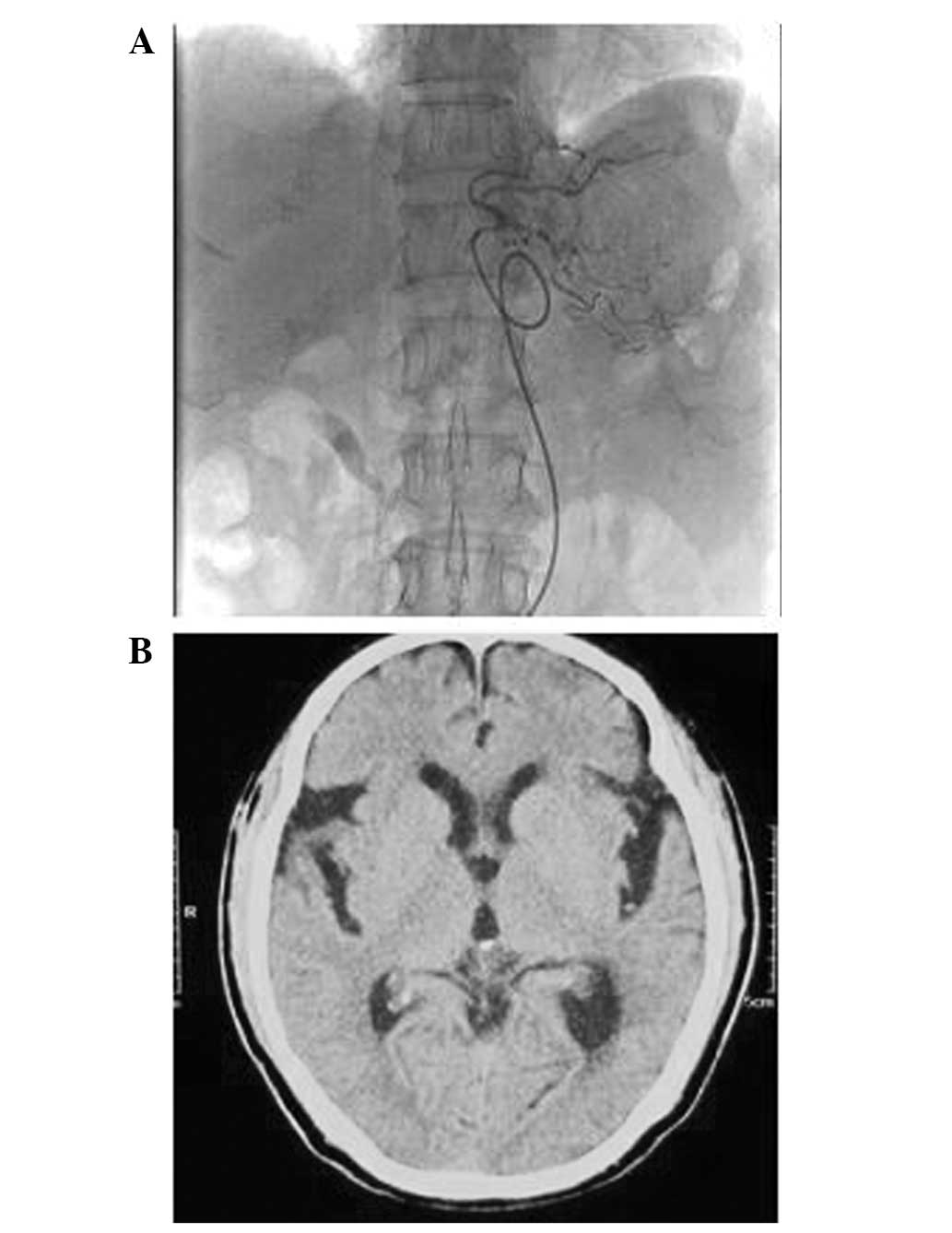Introduction
As the fourth most common type of cancer and the
second most common cause of cancer-related mortality worldwide,
gastric cancer has a high incidence, particularly in Asia (1,2).
However, the majority of gastric cancers have progressed to an
advanced stage at the time of diagnosis, including liver, lymph
node, lung or bone metastasis, or peritoneal dissemination.
However, advanced gastric cancer with brain metastasis is extremely
rare and results in a poor prognosis (3). The current study presents a case of
gastric cancer with brain metastasis effectively treated with
arterial infusion by a combination of tegafur, epirubicin and
lobaplatin. Written informed consent was obtained from the
patient.
Case report
A 73-year-old male was admitted to the Third
Affiliated Hospital of Anhui Medical University (Hefei, China) with
headache, nausea/emesis and a disturbance in the nervous system
(convulsions and balance/gait problems). Computed tomography and
magnetic resonance imaging scans revealed a cerebral tumor in the
left temporal lobe and cerebral edema was located around the lesion
(Fig. 1A–C). Simultaneously, the
patient complained of discomfort in the upper abdomen for six
months and had experienced a 10-kg weight loss. Therefore, the
patient received barium esophagogram and endoscopic examination
(Fig. 2A and B). The results
demonstrated advanced gastric cancer with a primary lesion located
in the gastric cardia. Pathological examination considered the
lesion to be a poorly differentiated adenocarcinoma (Fig. 2C). The laboratory examination
identified carcinoembryonic antigen (CEA) levels of 283.4 ng/ml and
carbohydrate antigen (CA) 19-9 levels of 283.4 U/ml, and the stool
was positive for occult blood test (3+). No symptoms of anemia were
identified.
Intra-arterial infusion of anticancer drugs was
performed on June 26th, 2012. Angiography revealed blood supply to
the primary lesion via the left gastric artery (Fig. 3A) and to the brain metastasis via
the left internal carotid artery. Therefore, the method of one-shot
intra-arterial injection was adopted. The catheter was inserted
into the left gastric artery for infusion of 800 mg tegafur, 20 mg
epirubicin hydrochloride and 30 mg lobaplatin; and it was inserted
into the left internal carotid artery for infusion of 400 mg
tegafur, 10 mg epirubicin hydrochloride and 20 mg lobaplatin.
Following four cycles of intra-arterial infusion chemotherapy
(received approximately every one month), the metastatic brain
tumor (Fig. 3B) and discomfort in
the upper abdomen had disappeared. Simultaneously, the neurological
symptoms of the patient were completely improved. However, serum
CA19-9 and CEA levels (268.7 U/ml and 270.2 ng/ml, respectively)
did not markedly decrease.
Discussion
Gastric cancer is the most common malignant tumor
worldwide. In China, gastric cancer is diagnosed in ~400,000
individuals every year, accounting for 42% of the global incidence
of gastric cancer. However, gastric cancer with brain metastasis is
extremely rare. Previously, York et al(4) reported that only 24 out of 3,320
(0.7%) gastric cancer patients were identified with brain
metastasis during a 40-year period (1957–1997) at the MD Anderson
Cancer Center. In addition, Kasakura et al(5) identified brain metastasis in only 11
out of 2,322 (0.47%) patients between 1980 and 1998. The incidence
of brain metastases is markedly lower than that of lung, breast,
renal and other types of cancer. Associated clinical studies have
shown that the majority of the gastric cancer patients with brain
metastases exhibit primary lesions located in the gastric cardia.
The patient in the current study exhibited a primary lesion also
located in the gastric cardia. Advanced gastric cancer patients
with brain metastases usually have a poor prognosis and a poor
median survival rate (4–7).
Treatment for advanced gastric cancer with brain
metastases is usually conservative, palliative and aimed at
reducing the patient’s discomfort and improving the quality of
life. Traditional treatment methods include systemic chemotherapy,
whole brain radiotherapy, γ-knife radiosurgery and palliative
surgical resection; however, the improvement in the median overall
survival rate has remained dissatisfying (4,8,9).
Intra-arterial infusion chemotherapy is performed using a catheter
inserted into the artery supplying blood to the tumor. A highly
concentrated chemotherapeutic agent is injected directly into the
primary lesion and/or metastasis. The advantages of the treatment
include delivery of a greatly improved chemotherapeutic agent to
the tumor site and a reduction of adverse effects on the various
systems of the body (10). In the
present case report, the metastatic brain tumor and discomfort in
the upper abdomen disappeared following treatment. In addition, the
neurological symptoms of the patient were completely improved
following four cycles of intra-arterial infusion chemotherapy.
Overall, intra-arterial infusion chemotherapy was effective for
advanced gastric cancer with brain metastasis in the present case.
However further investigation is required in a large-sample study
to confirm its validity.
References
|
1
|
Parkin DM, Bray F, Ferlay J and Pisani P:
Global cancer statistics, 2002. CA Cancer J Clin. 55:74–108. 2005.
View Article : Google Scholar
|
|
2
|
Kamangar F, Dores GM and Anderson WF:
Patterns of cancer incidence, mortality and prevalence across five
continents: defining priorities to reduce cancer disparities in
different geographic regions of the world. J Clin Oncol.
24:2137–2150. 2006. View Article : Google Scholar
|
|
3
|
Kim M: Intracranial involvement by
metastatic advanced gastric carcinoma. J Neurooncol. 43:59–62.
1999. View Article : Google Scholar : PubMed/NCBI
|
|
4
|
York JE, Stringer J, Ajani JA, Wildrick DM
and Gokaslan ZL: Gastric cancer and metastasis to the brain. Ann
Surg Oncol. 6:771–776. 1999. View Article : Google Scholar : PubMed/NCBI
|
|
5
|
Kasakura Y, Fujii M, Mochizuki F, Suzuki T
and Takahashi T: Clinicopathological study of brain metastasis in
gastric cancer patients. Surg Today. 30:485–490. 2000. View Article : Google Scholar : PubMed/NCBI
|
|
6
|
Lee JL, Kang YK, Kim TW, Chang HM, Lee GW,
Ryu MH, et al: Leptomeningeal carcinomatosis in gastric cancer. J
Neurooncol. 66:167–174. 2004. View Article : Google Scholar : PubMed/NCBI
|
|
7
|
Hasegawa T, Fujii M, Mochizuki F, Suzuki T
and Takahashi T: Clinicopathological study of brain metastases from
gastrointestinal tract cancer. Surg Neurol. 60:506–514. 2003.
View Article : Google Scholar : PubMed/NCBI
|
|
8
|
Park YS, Chang JH, Chang JW and Park YG:
The efficacy of gamma knife radiosurgery for advanced gastric
cancer with brain metastases. J Neurooncol. 103:513–521. 2011.
View Article : Google Scholar : PubMed/NCBI
|
|
9
|
Hauswald H, Dittmar JO, Habermehl D,
Rieken S, Sterzing F, Debus J and Combs SE: Efficacy and toxicity
of whole brain radiotherapy in patients with multiple cerebral
metastases from malignant melanoma. Radiat Oncol. 7:1–7. 2012.
View Article : Google Scholar : PubMed/NCBI
|
|
10
|
Ota T, Shuto K, Ohira G, Natsume T, Saito
H, Sato A, Kawahira H, Nabeya Y and Matsubara H: Evaluation of
hepatic arterial infusion chemotherapy for liver metastasis from
gastric cancer. Gan To Kagaku Ryoho. 36:2019–2021. 2009.(In
Japanese).
|

















